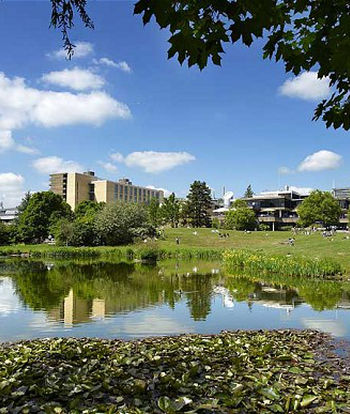 The University of Bath is relatively small compared to other UK universities. The total number of full-time students is 8,000, including 1,500 overseas students from more than 100 countries. The university’s modern green campus is located two kilometers from the city centre.
The University of Bath is relatively small compared to other UK universities. The total number of full-time students is 8,000, including 1,500 overseas students from more than 100 countries. The university’s modern green campus is located two kilometers from the city centre.
Bath is in the southwest of England, a beautiful and historic city and, in fact, the largest city in southwest England. The city has an international airport, highways and excellent railway links. It takes about 20 minutes to travel from the city to Bath international Airport by shuttle, bus or taxi. It takes approximately 90 minutes to travel to London by train.
Academic Strengths
The University of Bath (informally Bath University, or simply Bath) was established in 1966. It strives to modernise both on the appearance of the school buildings and its development prospects. Over the years, independent accrediting institutes have ranked the University of Bath as a top UK University. In the past two years, The Times Good University Guide rated the university the top fifth in the country. It is a well-known centre of excellence for Engineering, Humanities and Social Sciences, Management and Science. In 2001, the government awarded £8.3 million to the university for its scientific research infrastructure and scientific research assessment activities, showing recognition of the university’s outstanding performance.
University Facilities
Library and Study Centres at the University of Bath are in possession of 300,000 volumes of monographs, 105,000 bound journals, and 2,000 subscribed journals. The library has more than 800 study seats and was the first UK university library to open 24 hours a day.
The university is in particular proud of its excellent sports facilities and sporting traditions. In 1976, the university was the first UK University to set up athletic scholarship programmes for overseas athletes. Since then, the university is committed to being the pioneer for providing continuous and comprehensive sports facilities. Besides the members of the university student sports clubs and university staff, more than 200,000 people also regularly use the university’s sports facilities. The Sports Training Village has Olympic sized swimming pools, an outdoor track, field stadium, indoor and outdoor tennis courts, an artificial turf stadium (for football, rugby, cricket and netball), a well-equipped gym and rifle shooting range. Bath sent 28 athletes to the Sydney Olympic Games and the university has spent twenty million pounds to further improve the sports facilities.
Student Life
At the beginning of each semester, the university’s International Office offers an orientation programme for the students, including an airport pick up service. International Student Advisors (ISA) arrange activities for the new students, to help them acclimatise to the university environment. They also provide visiting and consulting services throughout the year, where students can get information and advice on a wide range of issues. The International Office always organises a series of sightseeing and social activities throughout the year and will notify international students about upcoming events via e-mail.
Recommended Courses
Science and Engineering undergraduate courses: Architecture, Business Management, Civil Engineering, Mechanical Engineering, Pharmacy and Pharmacology, Physics, Social Policy and Administration.
Entry Requirements
• IELTS 6.0
• TOEFL 550 points (paper test)
• TOEFL 230 points (computer test)
Humanities, Social Science and Management undergraduate courses; Science and Engineering and Master’s degree studies
• IELTS 6.5
• TOEFL 580 points (paper test)
• TOEFL 237 points (computer test)
Master’s programmes require a higher English language ability (e.g. MBA)
• IELTS 7.0
• TOEFL 600 points (paper test)
• TOEFL 250 points (computer test)
Costs
International Foundation: Approximately £8,250 per year
Undergraduate Arts: £ 10,000 per year
Undergraduate Science: £12,750 per year
Postgraduate Students: Approximately £10,000-£13,150 per year
Cost of Living: Approximately £7,488 per year
